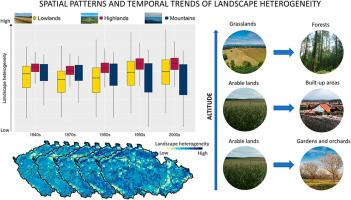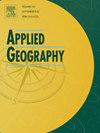自 19 世纪 40 年代以来,景观的异质性表现出截然不同的空间模式,但时间变化却相似
IF 4
2区 地球科学
Q1 GEOGRAPHY
引用次数: 0
摘要
研究景观异质性(LH)及其随时间的变化对于了解生态系统动态以及制定有效的生物多样性保护和气候变化适应战略至关重要。然而,由于可用的土地覆盖数据有限,这种大面积、长时间的研究并不多见。在此,我们研究了自 19 世纪 40 年代以来捷克共和国境内土地覆被的两个组成部分,即代表土地覆被多样性的组成性土地覆被和反映空间景观结构的构型性土地覆被。利用数字化地形图和香农指数,我们分析了 LH 分布及其与土地覆被变化的关系。我们的研究结果表明,LH 成分的空间模式不同,尤其是中低海拔地区与山区相比。时间趋势表明,自 19 世纪 70 年代以来,中低海拔地区的 LH 在土地向城市和农业区转化的推动下持续增长。相反,山区则呈现出相反的趋势,由于森林扩张,成分 LH 出现下降。我们强调,在生态研究中必须同时考虑 LH 的组成成分和构型成分,并使用可直接比较两者的指数。本文章由计算机程序翻译,如有差异,请以英文原文为准。

Landscape heterogeneity shows contrasting spatial patterns but similar temporal changes since the 1840s
Studying landscape heterogeneity (LH) and its changes over time is crucial for understanding ecosystem dynamics and developing effective strategies for biodiversity conservation and climate change adaptation. However, such studies over large areas and long time periods are rare due to the limited availability of land-cover data. Here, we examine two components of LH across the Czech Republic since the 1840s, namely compositional LH representing land cover diversity and configurational LH reflecting spatial landscape structure. Using digitised topographic maps and the Shannon index, we analyse LH distribution and its relationship with land cover changes. Our results show different spatial patterns in LH components, especially in low- and mid-elevation regions compared to mountainous areas. Temporal trends indicate a consistent increase in LH since the 1870s in low- and mid-elevation regions driven by land conversion to urban and agricultural areas. Conversely, mountainous regions show contrasting trends, with compositional LH declining due to forest expansion. We emphasise the importance of considering both the compositional and configurational components of LH in ecological studies and using indices that allow direct comparison between them.
求助全文
通过发布文献求助,成功后即可免费获取论文全文。
去求助
来源期刊

Applied Geography
GEOGRAPHY-
CiteScore
8.00
自引率
2.00%
发文量
134
期刊介绍:
Applied Geography is a journal devoted to the publication of research which utilizes geographic approaches (human, physical, nature-society and GIScience) to resolve human problems that have a spatial dimension. These problems may be related to the assessment, management and allocation of the world physical and/or human resources. The underlying rationale of the journal is that only through a clear understanding of the relevant societal, physical, and coupled natural-humans systems can we resolve such problems. Papers are invited on any theme involving the application of geographical theory and methodology in the resolution of human problems.
 求助内容:
求助内容: 应助结果提醒方式:
应助结果提醒方式:


